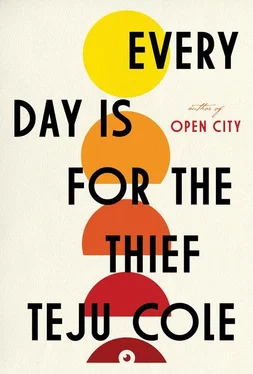It is early evening when the aircraft approaches the low settlements outside the city. It drops gently and by degrees toward the earth, as if progressing down an unseen flight of stairs. The airport looks sullen from the tarmac. It is named for a dead general, and is all that is worst about the architecture of the seventies. With its shoddy white paint and endless rows of small windows, the main building resembles a low-rent tenement. The Air France Airbus touches down and glides onto the tarmac. Relief enters the holds and cabin with the inward-rushing air. Some of my fellow passengers break into applause. Soon, we are trooping out of the craft. A woman weighed down with bags tries to barge through the aisle. “Wait for me,” she cries out to her travel companion, loud enough for everyone to hear, “I’m coming.” And I, too, experience the ecstasy of arrival, the irrational sense that all will now be well. Fifteen years is a long time to be away from home. It feels longer still because I left under a cloud.
Disembarkation, passport control, and baggage claim eat up more than an hour of our time. The sky outside fills with shadows. One man argues with a listless customs official about the inefficiency.
— This is an international airport. Things should be better run. Is this the impression visitors should have of our nation?
The official shrugs, and says that people like him should return home and make it better. While we wait for the luggage machine to disgorge the bags, a white man next to me makes small talk. He has a brogue, and I ask if he is Scottish. “Aye,” he says, and he informs me that he works on the rigs.
— Got drunk in Paris last night, and got robbed. Firkin’ frogs lifted me credit card. But the Champs-Élysées was something! Aye, pissed out me mind. Skunk drunk.
He grins. His teeth are studded with metal. He wears an earring and sports a ginger-tinged five-o’clock shadow. He is not Europe’s finest, but he’ll earn well here.
— Won’t get a flight to Port Harcourt till tomorrow. Staying at the Sheraton tonight. That’s where the air hostesses stay, if you get me drift.
I nod. My bags finally arrive, damp and streaked with dirt. I lift them onto a cart. On the way out, an official in mufti motions me to stop. He is seated to the side of the door, and doesn’t really appear to have any actual function. He’s just there. He asks if I am a student. Well, yes, sort of. I figure the lie will speed things along.
— Eh ehn, I thought so. You have that student look. And where do you study?
NYU, I say, the answer that would have been correct three years ago. He nods.
— Well, in New York, they spend dollars. You know, dollars.
A meaningless silence passes between us. Then, sotto voce, and in Yoruba, his demand:
— Ki le mu wa fun wa? What have you brought for me for Christmas? Because, you know, they spend dollars in New York.
I have brought only resolve. I ignore him and roll my bags out to where Aunty Folake and her driver wait for me. When we unlock from our embrace, there are tears in her eyes. A scene out of the prodigal son. She hugs me again and laughs heartily.
— You haven’t changed at all! How is that possible?
Outside, the airport looks finer, more regal than it did on approach. The entrances are clogged with passengers’ relatives and, in far greater number, touts, hustlers, and all sorts of people who are there because they have nowhere else to be.

On the way home from the airport, at the roundabout of Ikeja bus stop, where the late afternoon rush makes the traffic snarl, we come to a complete standstill. Not more than twenty yards away from us, under the overpass, two policemen bicker. “Go away,” one yells at his partner. “Why you always dey stand here? Why you no go stand that side?” He points to the far side of the roundabout. For a moment, it seems as if the other officer sees the sense in the suggestion, but he is slow about carrying it out because the disagreement has by now attracted stares from pedestrians. He is reluctant to lose face. Both men are slim and dark, in gray-black uniforms, with machine guns slung over their shoulders. They stand confused and silent like a pair of actors who have forgotten their lines. A crowd of commuters gawks at them from a safe distance.
Aunty Folake explains what is going on. Policemen routinely stop drivers of commercial vehicles at this spot to demand a bribe. The officer being told off has drifted too close to his colleague’s domain. Such clustering is bad for business: drivers get angry if they are charged twice. All this takes place under a billboard that reads “Corruption Is Illegal: Do Not Give or Accept Bribes.”
And how much of the government’s money, I wonder, was siphoned off by the contractor who landed the contract for those billboards?
It is one thing to be told of the “informal economy” of Lagos, and quite another to see it in action. It puts pressure on everybody. Some fifteen minutes before we reached Ikeja bus stop, we had passed a toll gate on Airport Road. It, too, was in the shadow of a large billboard condemning corrupt practices and urging citizens to improve the country. The toll at the booth was set at two hundred naira: this was advertised and understood. However, enterprising drivers, such as ours, know that they can get through the toll gate if they pay just half of that. The catch is that the hundred naira they pay goes straight into the collector’s purse. “Two hundred you get ticket stub,” our driver says, “one hundred you get no ticket. What do I need ticket for? I don’t need ticket!” And in this way, thousands of cars over the course of a day would pay the toll at the informal rate, lining the pockets of the collectors and their superiors. The demand from the immigration officer, the Ikeja police, the toll booth story: I encounter three clear instances of official corruption within forty-five minutes of leaving the airport.
Even before I get home that night, though, I see other ways of thinking about these exchanges of money. We stop at Ogba to buy bread. Ogba is some way past Ikeja, at the end of Agidingbi Road. On the way into the shop a doorman salutes us and holds the door open. When we leave the building a few minutes later, he follows us for twenty yards as we move toward the car, and asks for a tip. It is not a demand: it is soft. He does it with the gentleness of someone explaining something to a child.
— Do you have anything for me, sir?
He wears an off-white security guard’s uniform and carries no weapon. When my aunt shakes her head, he shakes his head apologetically, smiles, and melts away. When we get to the car, a thin woman in tattered buba and iro approaches us and says she wants some money for transportation to get home. I don’t see her approach, actually; she is just suddenly there, in front of me. She is small and looks ill. A small woman without a name: she is a part of what lies behind the gleaming merchant banks, the posh eateries, the luxury cars. The people who are suddenly there, the many who live off these small gifts.
Night descends with no warning. I am breathing the air of the city for the first time in a decade and a half, its white smoke and ocher dust which are as familiar as my own breath. But other things, less visible, have changed. I have taken into myself some of the assumptions of life in a Western democracy — certain ideas about legality, for instance, certain expectations of due process — and in that sense I have returned a stranger. What the trip back from the airport makes me think, and what is confirmed over the course of the following days, is the extent to which Lagos has become a patronage society.
Читать дальше













